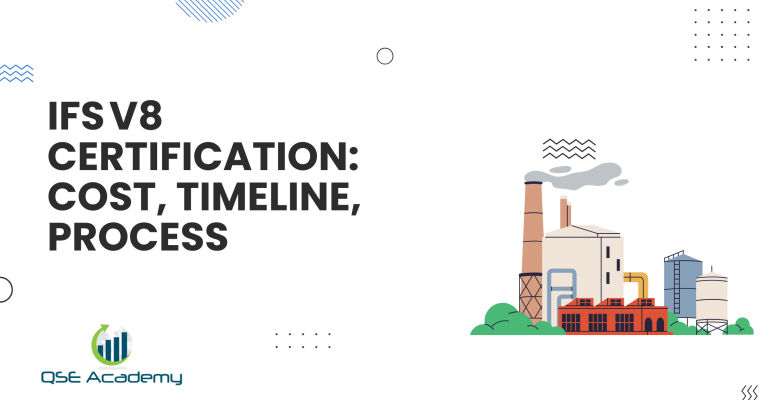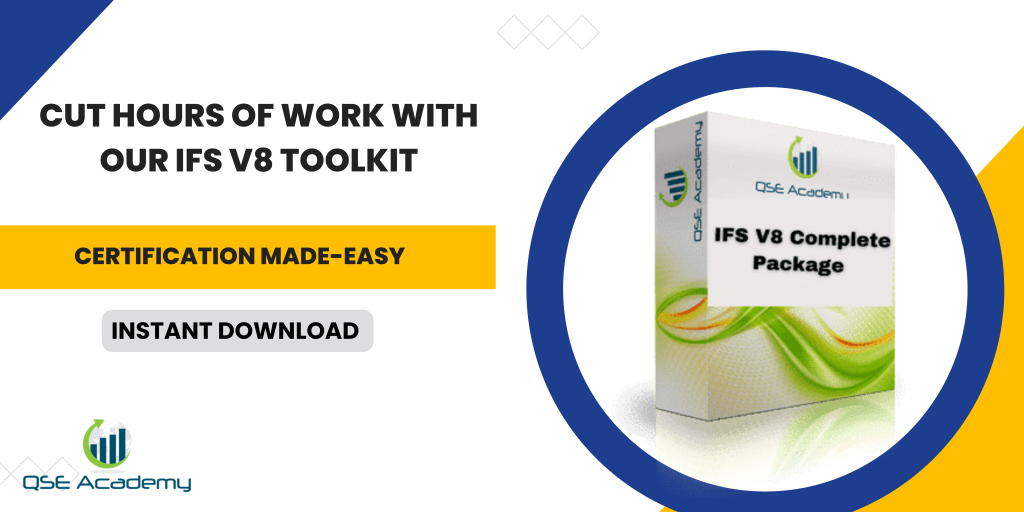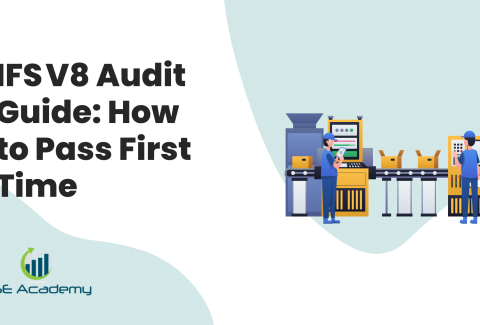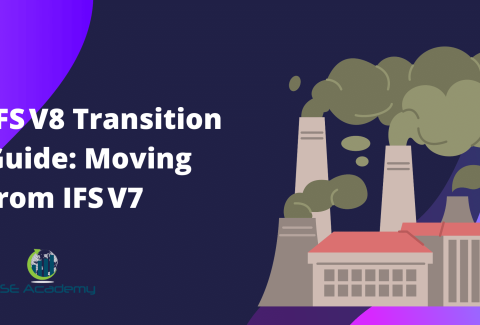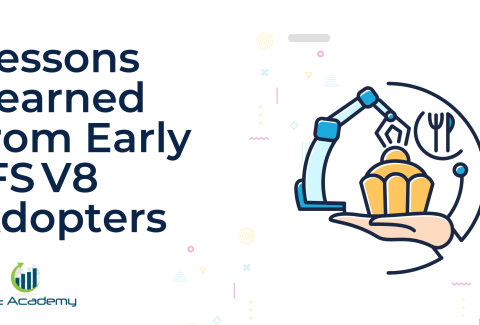IFS V8 Certification: Cost, Timeline, Process
Last Updated on November 19, 2025 by Melissa Lazaro
Clarity Before You Begin
When organizations start exploring IFS certification, three questions come up almost immediately: How much will it cost? How long will it take? And what does the process actually involve?
These questions make sense. Certification isn’t just a technical requirement. It affects budgeting, staffing, supplier relationships, and sometimes access to major retail markets. After years supporting companies through IFS preparation, audit readiness, and certification body selection, I’ve seen how powerful it is when teams start with the right understanding.
If you’re here to plan realistically—not guess—you’re in the right place. By the end of this guide, you’ll have a clear overview of the full certification journey: the steps, the time investment, the cost drivers, and what maintaining certification looks like beyond the first audit.
What Is IFS V8 Certification & Who Needs It
IFS V8 is a GFSI-recognized food-safety and quality certification designed for food manufacturers, logistics providers, brokers, and organizations supplying private-label brands. Many European retailers require it, and increasingly, large global buyers expect suppliers to hold a recognized GFSI scheme—IFS being one of the most common.
Businesses pursue IFS for several reasons:
- To meet retailer or customer requirements
- To strengthen food-safety and traceability controls
- To improve credibility and market access
- To demonstrate maturity in operational and quality practices
Before committing, it helps to confirm whether IFS is the required standard or whether alternatives like BRCGS or FSSC 22000 are acceptable. In many cases, the choice depends on specific customer expectations rather than internal preference.
Pro Tip: Clarify buyer expectations early to avoid unnecessary certification changes later.
 The IFS Certification Process — From Planning to Approval
The IFS Certification Process — From Planning to Approval
IFS certification follows a structured path. Each step builds on the previous one:
- Scope definition and eligibility confirmation
- Gap analysis against IFS V8 requirements
- System development and documentation alignment
- Implementation and employee training
- Internal audit and management review
- Certification body audit
- Corrective actions and final decision
The process isn’t just about passing an audit — it’s about embedding and demonstrating operational discipline. A certification-ready system should function naturally, not just during audit week.
Pro Tip: Scheduling the certification audit early helps ensure timing aligns with operational readiness.
Timeline Overview — How Long Certification Typically Takes
There’s no universal timeline, because readiness levels vary. However, most organizations fall into one of three patterns:
| Starting Point | Estimated Timeline |
|---|---|
| Existing mature FSMS (e.g., already GFSI certified) | 3–6 months |
| Partial system developed / moderate readiness | 6–9 months |
| No structured system in place | 9–18 months |
One thing becomes clear across sectors: progress depends on consistent ownership, training, and internal accountability. The more integrated the system becomes into daily operations, the faster certification becomes achievable.
Pro Tip: Build the timeline backwards from the intended audit date to avoid time compression during the final months.
Cost Breakdown — What Drives IFS V8 Certification Pricing
IFS certification costs vary, but they follow a predictable structure. Most certification bodies calculate pricing based on:
- Required audit duration (man-days)
- Certification and administrative fees
- Auditor travel and accommodation
- Corrective action review
- Required follow-up activities
Several factors influence cost:
- Size of the organization (employee count and production shifts)
- Complexity and risk of products
- Type of operation (manufacturer, logistics, broker)
- Audit type (announced or unannounced)
Expect certification to be a recurring cost—not a one-time project. Future surveillance and recertification audits must also be budgeted.
Pro Tip: Request itemized quotations so you can compare based on equivalent scope and assumptions.
How Audit Duration Is Calculated — Understanding Man-Days
IFS uses defined duration tables to determine audit length based on:
- Scope
- Workforce size
- Process complexity
- Product category
- Risk profile
This ensures consistency between certification bodies. Duration isn’t negotiable but must reflect accurate, transparent scoping information. The more precise the information you submit, the more accurate the estimate will be.
Pro Tip: Provide full scope details—including seasonal workforce and shifts—to avoid revised estimates later.
Choosing the Right Certification Body — A Strategic Decision
While audit requirements are standardized, certification bodies differ in several important areas:
- Accreditation scope
- Auditor sector expertise
- Availability and scheduling timelines
- Clarity and transparency in communication
- Pricing structure and contract terms
A certification body isn’t just a vendor — they become part of your compliance ecosystem. Selecting one with relevant expertise and capacity improves the audit experience and reduces friction during evidence review or corrective action closure.
Pro Tip: Confirm auditor qualifications for your specific product group before signing.
Life After Certification — Maintaining Compliance Year-Round
Receiving the certificate isn’t the end of the journey — it’s the beginning of a continuous cycle. The certification process includes:
- Surveillance audits
- Corrective action follow-up
- Operational evidence updates
- Recertification every three years
Successful organizations maintain:
- Ongoing recordkeeping
- Internal audit schedules
- Staff competency development
- Change management documentation
- Improvement-based corrective actions
Treating compliance as part of routine operations—not an annual event—keeps the process manageable and predictable.
Pro Tip: Establish a monthly compliance calendar to track recurring requirements, reviews, and records.
FAQs — Common Questions Before Starting
Can I fast-track certification?
It’s possible if the system is already mature and the certification body has availability.
Is certification mandatory?
In many cases, yes — especially when supplying major retailers or private-label brands.
Do small companies need IFS?
It depends on customer expectations. Some start with supplier audits before full certification.
Conclusion — Confidence Comes from Understanding the Journey
IFS V8 certification requires planning, structure, and consistency — but it becomes far more manageable once cost, timeline, and process are understood. With the right preparation and approach, certification becomes a structured project rather than an overwhelming challenge.
If you’d like support with planning, a readiness assessment, or a customizable roadmap for your facility, I can help you move forward with clarity and confidence.
Melissa Lavaro is a seasoned ISO consultant and an enthusiastic advocate for quality management standards. With a rich experience in conducting audits and providing consultancy services, Melissa specializes in helping organizations implement and adapt to ISO standards. Her passion for quality management is evident in her hands-on approach and deep understanding of the regulatory frameworks. Melissa’s expertise and energetic commitment make her a sought-after consultant, dedicated to elevating organizational compliance and performance through practical, insightful guidance.

